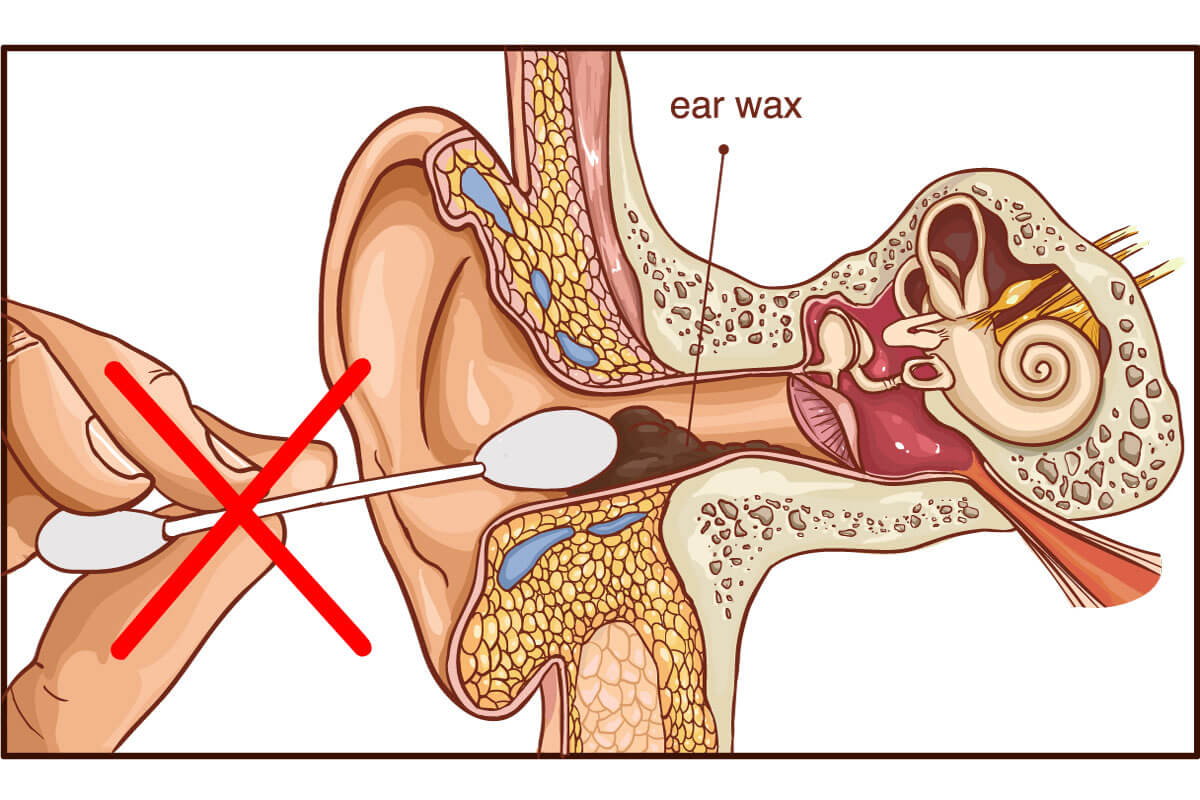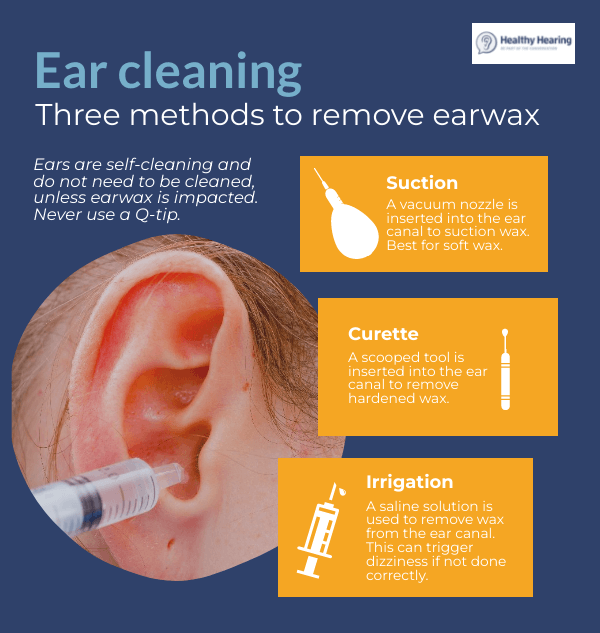To clean your ears at home, gently wash the outer ear with a cloth and use ear drops to soften wax. Avoid using cotton swabs or sharp objects inside the ear canal.So here is how to clean your ears at Home.
Ear health is essential for maintaining good hearing and preventing infections. Over time, our ears can accumulate wax, which, although protective, may sometimes obstruct the ear canal. It’s important to handle ear cleaning with care to avoid damage to the delicate structures inside.
The process should be safe, straightforward, and gentle. Home remedies such as over-the-counter ear drops or a warm, damp cloth can effectively clean the outer ear and help soften excess wax. Steer clear of invasive methods; never insert objects into your ear canal. Proper ear care at home can lead to a lifetime of healthy hearing, but always consult a healthcare professional if you experience pain, discomfort, or hearing loss.

Credit: www.cnet.com
Ear Cleaning: The Basics
Clean ears contribute to overall health and well-being. Discover the essentials of ear hygiene to maintain your auditory health.
Why Clean Your Ears?
Cleaning your ears removes excess wax. This prevents buildup and blockages. Clean ears may reduce the risk of infections and improve hearing clarity.
Earwax: Friend Or Foe?
While often thought of as a nuisance, earwax actually serves as a natural defender. It traps dirt and dust, protecting your ear canal. Yet, too much earwax can cause blockages.
The key is balance. Regular, gentle cleaning can assist in maintaining that balance. Avoid using cotton swabs deep inside your ears; they may push wax further in. Instead, opt for safer methods like over-the-counter earwax softening drops or simply a warm, damp washcloth to clean the outer ear.

Credit: www.amazon.com
Common Ear Cleaning Methods
Cleaning your ears is essential for maintaining good hygiene and preventing build-up. Let’s explore popular methods many people use to ensure their ears stay clean and healthy.
Over-the-counter Solutions
Several products can help you clean your ears safely:
- Ear drops: Designed to soften wax.
- Wax removal kits: These include softening drops and a bulb syringe for flushing.
- Ear vacuums: Gently remove earwax without pushing it deeper.
Each product comes with instructions. Follow them closely to avoid damage.
Home Remedies For Ear Cleaning
Simple methods using household items can also be effective:
- Warm water: A gentle flush can loosen wax.
- Oil drops: Olive or baby oil can soften wax overnight.
- Hydrogen peroxide: A few drops can help dissolve wax.
Never insert objects into your ear canal. It can cause more harm than good. Use these home remedies cautiously.
Steps For Safe Ear Cleaning At Home
Keeping ears clean is vital for good hearing and ear health. Using the right steps ensures this task is done safely. Discover how to effectively clean ears without causing damage.
Preparing For The Cleanup
- Wash hands thoroughly with soap and warm water.
- Collect all necessary supplies, such as a soft washcloth, a towel, and over-the-counter ear drops if needed.
- Find a well-lit space to see clearly during the cleaning process.
- Have a mirror handy to help with visibility.
Gentle Techniques To Try
- Begin by dampening a washcloth with warm water.
- Gently wipe the outer ear folds and behind the ear without inserting into the ear canal.
- For earwax buildup, use ear drops designed to soften the wax.
- After application, wait a few minutes before tilting the head to allow the wax to drain out.
- If necessary, repeat with a bulb syringe filled with warm water to irrigate the ear gently.
- Never insert sharp objects like cotton swabs or hairpins into the ear canal.
Aftercare And Maintenance
- Dry ears carefully with a towel after cleaning or showering.
- Practice regular hygiene routines while avoiding excessive cleaning that could trigger irritation or infection.
- For ongoing issues or discomfort, consult a healthcare provider for advice or treatment.
- Monitor ear health, and if hearing changes occur, seek medical attention promptly.
Regular aftercare keeps ears healthy after cleaning. Mild preventive measures help avoid future wax buildups and safeguard ear health.

Credit: www.happyearshearing.com
Mistakes To Avoid In Ear Hygiene
Taking care of your ears is crucial for good hearing and health. People often unknowingly engage in unsafe ear-cleaning habits. Below, dive into common missteps and how to maintain ear hygiene the right way.
Harmful Practices
Inserting Objects: Never put hard objects like cotton swabs or hairpins in your ears. This can push wax deeper or cause damage.
Ear Candles: Avoid ear candles. They pose a risk of burns and aren’t effective in wax removal.
Aggressive Cleaning: Scrubbing your ears harshly can irritate the skin. This can lead to infections.
Use of Chemicals: Steer clear of non-recommended liquids. Some can harm your eardrum.
- Never insert anything into your ear canal.
- Avoid the temptation to over-clean your ears.
- Stay away from ear candles and unsafe liquids.
Signs You’re Overcleaning
Itchiness: Constant itching may signal too much cleaning.
Discomfort: A sign of overcleaning is pain within the ear.
Dryness: Ears that feel dry might mean you’re overdoing ear care.
Infection: Frequent infections could indicate damage from overcleaning.
Respecting your ear’s natural processes is vital.
- Look out for itching or irritation.
- Note any unusual pain or discomfort.
- Check for excessive ear dryness.
- Be aware of repeated infections.
When To See A Professional
Ear care is a part of routine hygiene, but sometimes home cleaning is not enough. Professional help ensures safe and thorough cleaning, especially when specific symptoms arise. Understanding when to seek a professional’s assistance can prevent damage and ensure ear health.
Symptoms That Need Medical Attention
Ears usually self-clean with a natural migration of earwax outward. Intervention becomes necessary when symptoms suggest a problem.
- Persistent ear pain or discomfort
- Sudden hearing loss or profound deafness
- Ringing or buzzing sounds that won’t go away (tinnitus)
- Discharge that is pus-like or bloody
- An ear fullness feeling
- Dizziness or balance issues
- When over-the-counter treatments fail to help
These signs suggest that an ear condition may need more than a simple clean. A professional evaluation is critical.
Professional Cleaning Procedures
Doctors and specialists have safe methods to remove earwax and other debris without damaging the ear.
| Procedure | Description | Benefits |
|---|---|---|
| Ear Irrigation | Gentle flushing with water or saline solution | Non-invasive, suitable for most people |
| Microsuction | Using a microscope and a small suction device | Precise, quick, and often provides immediate relief |
| Manual Removal | Special tools like curettes | Effective for harder earwax or foreign bodies |
All procedures are performed by a healthcare provider. They can prevent complications associated with improper ear cleaning techniques.
Preserving Ear Health
Maintaining ear health is crucial for your overall well-being. Proper ear care helps prevent infections and ensures that your ears function properly. Discover simple techniques to clean your ears safely at home.
Daily Ear Hygiene Tips
Keeping ears clean is key to preserving hearing health. Follow these daily tips:
- Wipe Outer Ear: After showering, gently wipe the outer ear with a towel.
- Minimize Earbud Usage: Use earbuds wisely; giving ears a break prevents wax buildup.
- Avoid Cotton Swabs: These can push wax deeper; use only on outer ear areas if needed.
- Stay Dry: Keep ears dry to avoid infections; dry ears after swimming or bathing.
Regular Check-ups And Prevention
Regular ear check-ups are vital for spotting issues early. Prevent problems before they start:
| Check-Up Frequency | Preventive Measures |
|---|---|
| Adults: Once every 1-2 years | Earplugs in loud environments protect against noise damage. |
| Children: At every healthcare visit | Monitor earphone volumes to ensure kids’ hearing remains safe. |
| If you have hearing aids: As advised by a professional | Keep hearing aids clean and in good condition to prevent wax clogs. |
Spot changes in your hearing? Schedule a check-up right away. Early detection can lead to simpler, more effective treatment options.
Frequently Asked Questions On How To Clean Your Ears At Home
What Is The Best Way To Clean Your Ears?
To safely clean your ears, use a damp cloth to gently wipe the outer ear. Avoid inserting objects into the ear canal, including cotton swabs, which can push wax deeper. Seek professional cleaning if necessary.
How Do You Naturally Remove Ear Wax?
To remove ear wax naturally, soften it with a few drops of baby oil or mineral oil. After a day, gently flush the ear with warm water using a rubber-bulb syringe. Always avoid inserting objects into the ear canal.
How Do You Clean A Clogged Ear At Home?
To clean a clogged ear at home, use warm water or a saline solution. Tilt your head, pour a few drops in, wait a minute, then drain it out. Avoid cotton swabs, which can push wax deeper. If problems persist, consult a doctor.
How Do You Scoop Out Ear Wax?
Gently use a damp cloth to clean the outer ear. Avoid inserting anything into the ear canal; it’s risky. If needed, consult a healthcare professional for safe removal.
Conclusion
Cleaning your ears safely at home is simple if you follow the right steps. Stick to safe methods, like wiping the outer ear with a damp cloth and using ear drops if necessary. Remember, ear health is vital, so avoid cotton swabs or sharp objects that could cause damage.
For persistent issues, always consult a healthcare professional. Keep those ears clean and happy!
For more,follow mensmove.com





